Gambling on Premier League riches, divorce and ego trips - what it's like to own a EFL club
- Published
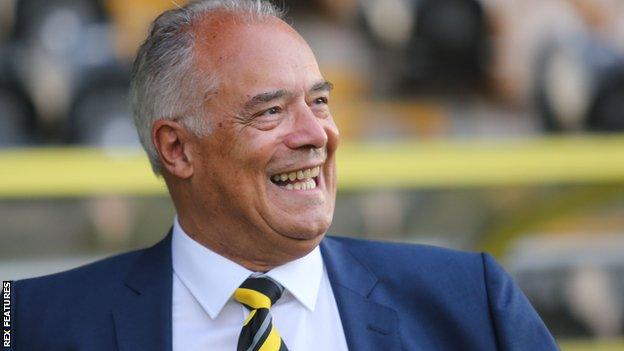
Ben Robinson took Burton from non-league football to the Championship in little more than a decade
The end of a marriage is the price that one of English football's most savvy owners has paid to run his club.
In little more than a decade, chairman Ben Robinson took a part-time Burton Albion side from the second division of non-league football to the Championship, where promotion to the Premier League is the biggest jackpot in world football.
Rising through the lower reaches of the English Football League to make it to the second tier in 2016, he says, took a great deal of work, care and time.
The pursuit of such success recently contributed to Bury's demise and expulsion from the EFL.
The cost for Robinson at Burton, however, was much different.
"It is fair to say that it was probably the cause of my divorce," he told BBC Radio 5 Live. "I probably shouldn't say that, but it is a fact."
With the downfall of Bury, recent financial troubles at Bolton and difficulties faced by many other clubs in the EFL, BBC Sport takes a look at what attracts owners to football clubs, how they make it financially viable and what happens when it goes wrong.
'The mindset is to get to the Premier League'
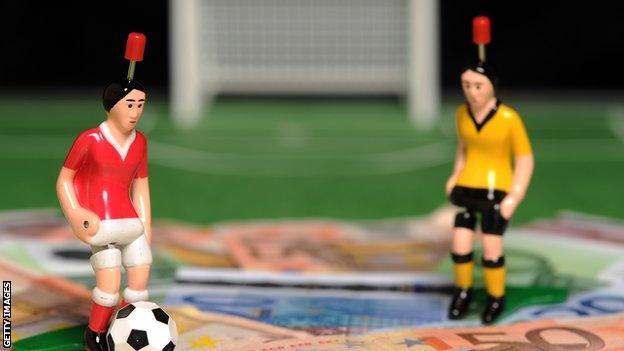
Ownership of clubs in the EFL has come under scrutiny after the demise of Bury
Of the 72 clubs that made up the EFL in 2017-18, just 16 reported profits. None of them came from the Championship where winning promotion to the Premier League is worth at least £170m.
Football finance expert Kieran Maguire, a lecturer at the University of Liverpool, said clubs in the EFL are in "a precarious state" with the league "propped up by owners putting their own money in".
In the Championship, Burton were the smallest club with the smallest budget, smallest stadium and smallest crowds.
Their greatest source of income is what trickles down from the Premier League in the form of solidarity payments and what central money is handed out from the EFL.
In 2006, an FA Cup tie against Manchester United, which the Brewers forced to a replay at Old Trafford, generated enough money to pay off loans on their Pirelli Stadium home.
"Everyone wants success," Robinson added. "Everyone wants progress in the cup because that can create an immense financial windfall, which we have seen.
"In the two years in the Championship we made two substantial profits. For us it has always been a bigger challenge because of the fan base here - recently we played Bournemouth in the Carabao Cup and we had 2,500 here and over 400 travelled up from Bournemouth on a Wednesday evening.
"With bigger clubs what we have seen develop in this country is an influx of a lot of investment from people with considerable fortunes whose mindset really is to invest and get to the Premier League."
'A lethal cocktail for owners'
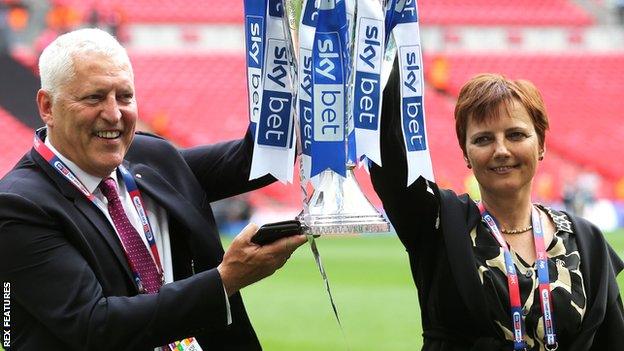
Mark and Nicola Palios took a controlling interest in Tranmere in August 2014
The rewards for taking risks in pursuit of such riches and the difficulty the EFL has in policing owners, which is the subject of an independent inquiry following Bury's demise, is a recipe for danger, according to Tranmere Rovers owner and former Football Association chief executive Mark Palios.
"What makes the (football) pyramid unique is the fact that it allows ambition to thrive through linked promotion and relegation," he said.
"But you have gaps (in financial rewards), ambition, which should be there, and you add to that poor regulation and you have a lethal cocktail.
"There is no doubt the regulations need changing and that the owners' and directors' test is ineffective. The whole thing need a radical rethink."
'My mistake was chasing success'
Notts County are another club that teetered on the brink of financial collapse in the summer.
The Magpies, a founding member of the Football League 131 years earlier, were relegated to the non-league ranks for the first time in their history in May.
Alan Hardy was the owner that saw the club sink to new depths, although he was also the one to have bought the club in a similar time in need in January 2017.
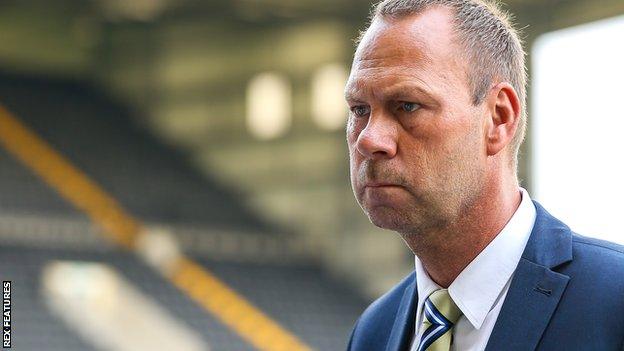
Alan Hardy's Notts County were relegated to the National League after losing to Swindon Town on the final day of the 2018-19 season
Hardy says he took over at Meadow Lane knowing the club was losing £1m per year, and within months of his takeover the Women's Super League side linked to the club went bust.
And yet, the Nottingham businessman admits he allowed losses to increase as they pushed for promotion from League Two.
"The mistake I made was chasing success," he said. "If that £1m loss was stretched to £1.5m or £1.6m, would it get us success?"
And yet, he said that gamble is not what caused the financial distress which led to players and staff not being paid on time on occasions and winding-up petitions being brought against the club.
"It was to do with my core business funding it," he said. "It made profits for 33 successive years, and when I put my full-time focus in Notts it went from being a very profitable company to one eventually losing its life."
Hardy said he is a "firm believer" that there are only two ways to make a club "sustainable in the EFL".
"One, it either has to have an excellent recruitment programme where it can bring through home-grown players and eventually sell them; or secondly a philanthropic owner who is going to just prop up the club," he added.
"I don't see any other way for an EFL club to survive."
Palios, however, disagrees saying the view on philanthropic owners and becoming a selling club is "too simplistic".
Instead, Tranmere under Palios has become a more diverse business, which has branched out into education, community projects, an international football academy and eSports.
The Merseyside club has also recently attracted investment from Indonesia.
"There has to be a different model," Palios said.
"What I tried to do when I came here was get to a position where we created businesses within the football club that no matter what happens on a Saturday they would still produce money.
"One important thing is that people don't realise what the potential of a local club is sitting in its community."
'This is no ego trip'
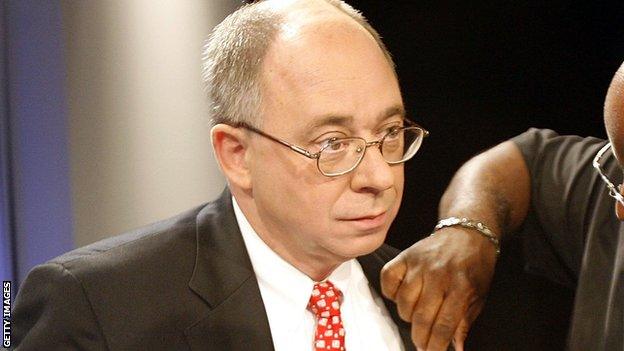
American investor Rob Couhig unsuccessfully ran for Congress in 1980 and 1999 and finished fourth in the 2006 and 2010 New Orleans Mayoral races
Rob Couhig is the owner of a legal firm in the United States that appears close to taking a 75% stake in Wycombe Wanderers.
Legacy members of the League One club's Trust are voting to determine if the former owner of a minor league baseball club, whose bid to take over Yeovil fell through earlier this year, will be allowed to become the major stakeholder at Adams Park.
The American says he has "global" ambitions for the Buckinghamshire side but insists his plans are grounded on a "financially sustainable model".
"I'm not there to just spend my money foolishly, which I have earned through hard work, on some sort of ego trip," he said.
"On the other hand, I'm absolutely there to spend my money so that we can produce the best possible product that can enhance its value over time, create a benefit for the community and ultimately will pay off so that we can have a joy of being part of something that's bigger than ourselves."
'Football clubs are simple to run'
Couhig likens the job of an owner to that of a "curator".
"If you're an owner, even for just a few weeks or months, you're involved in the transitory process. Somebody is going to come after you and everybody will be concerned about the club and its history," he said.
"You have to make it better. So that excites me."
Palios, who has owned Tranmere Rovers since August 2014, said clubs are "fairly simple to run".
"You can see what it is going to cost and you can see how much extra you want to gamble. It's that simple, because there are not that many variables in a football club.
"If someone wants to run a club and cut the cloth accordingly, they can do."
'My advice, don't buy a club'
Hardy, who this week also relinquished control of non-league side Ilkeston,, external was one that went in the opposite direction, endangering the future of one of world football's oldest clubs and paid a personal price with the collapse of his main business.
He said he has long been the focus of public abuse, with his presence on social media only making it worse with spats with fans of his own club as well as rival sides.
Hardy also came out to make a public apology after inadvertently included a nude photo of himself in a post on Twitter the same day that he put the club up for sale in January.
"Only last weekend I was walking though the city shopping and I was abused by hordes of supporters, and spat on with my 10-year-old also spat on," Hardy said.
"Nothing is worth that."
And that sums up his advice to anyone wanting to buy a club.
"I'd try talk them out of doing it," Hardy said. "Not from the monetary side, but from the amount of abuse and I'm not the only one who has suffered."